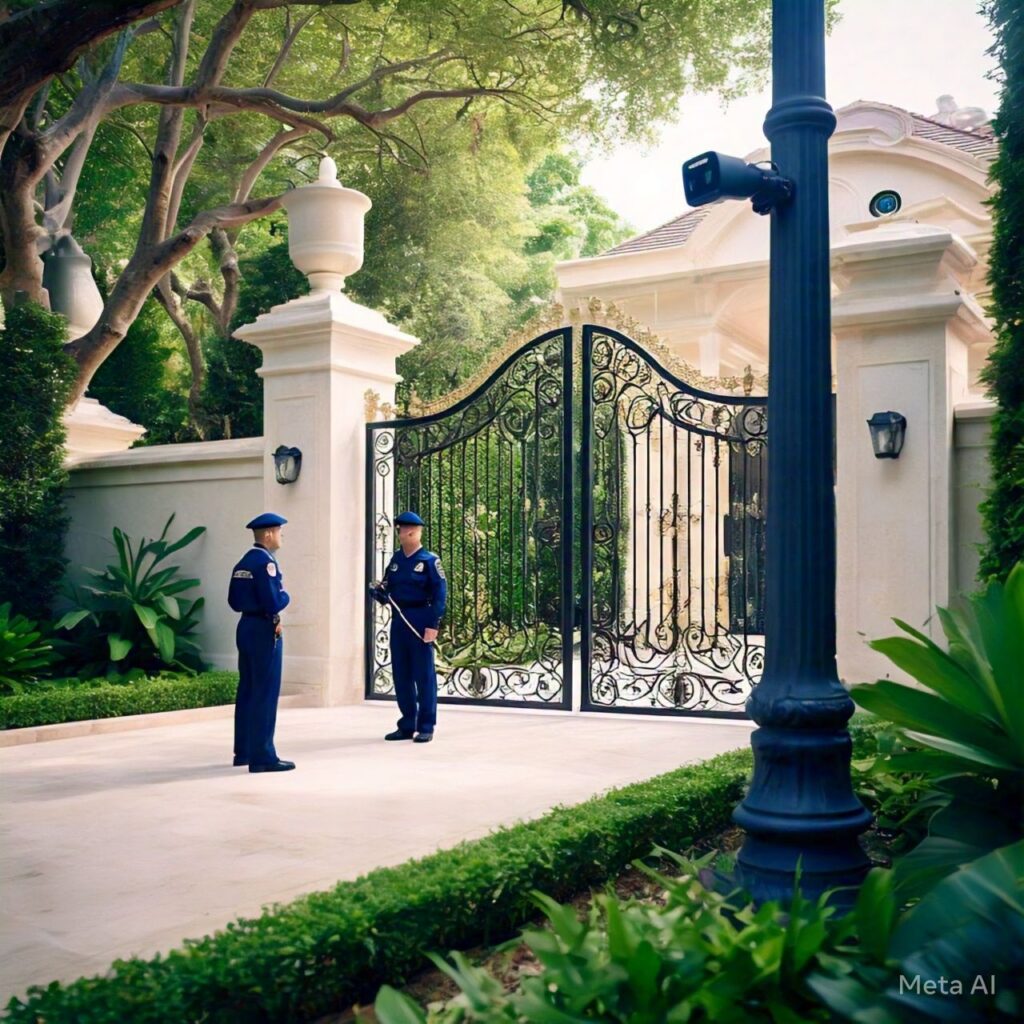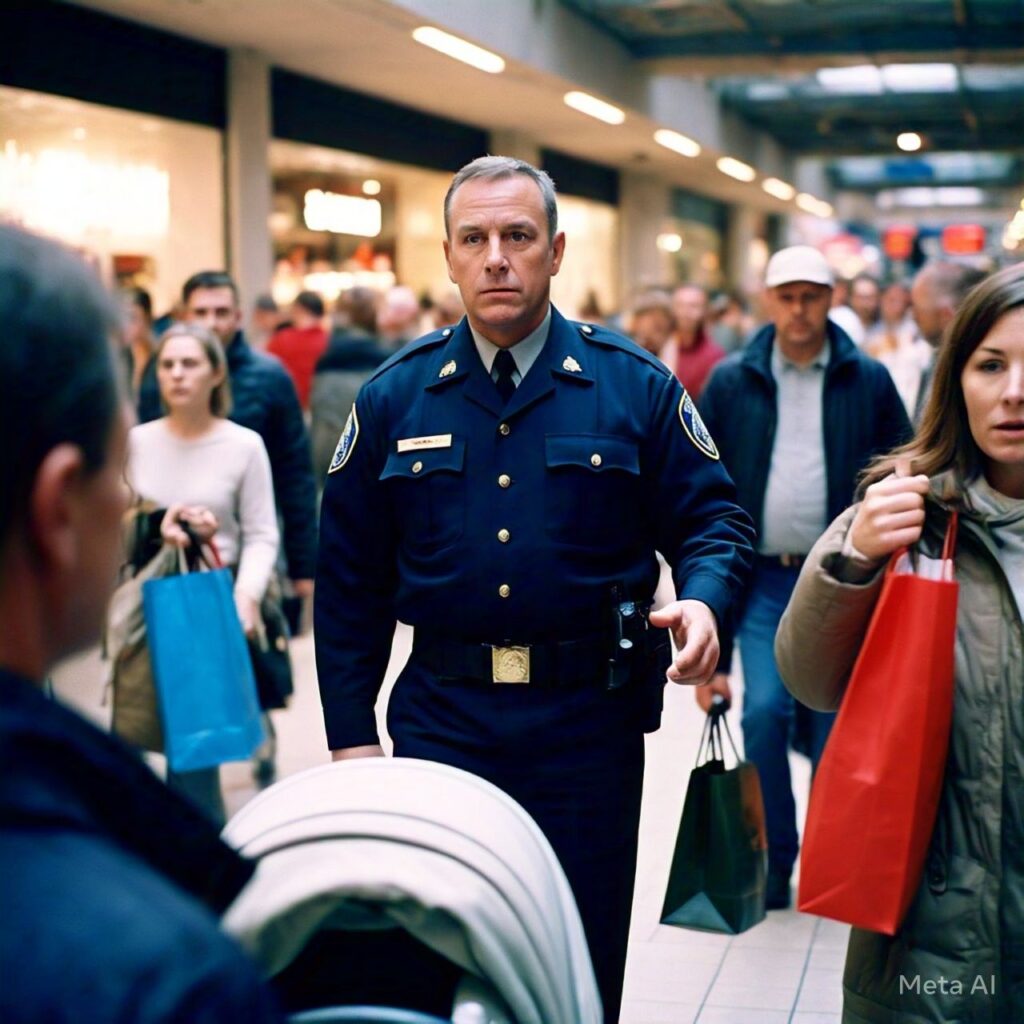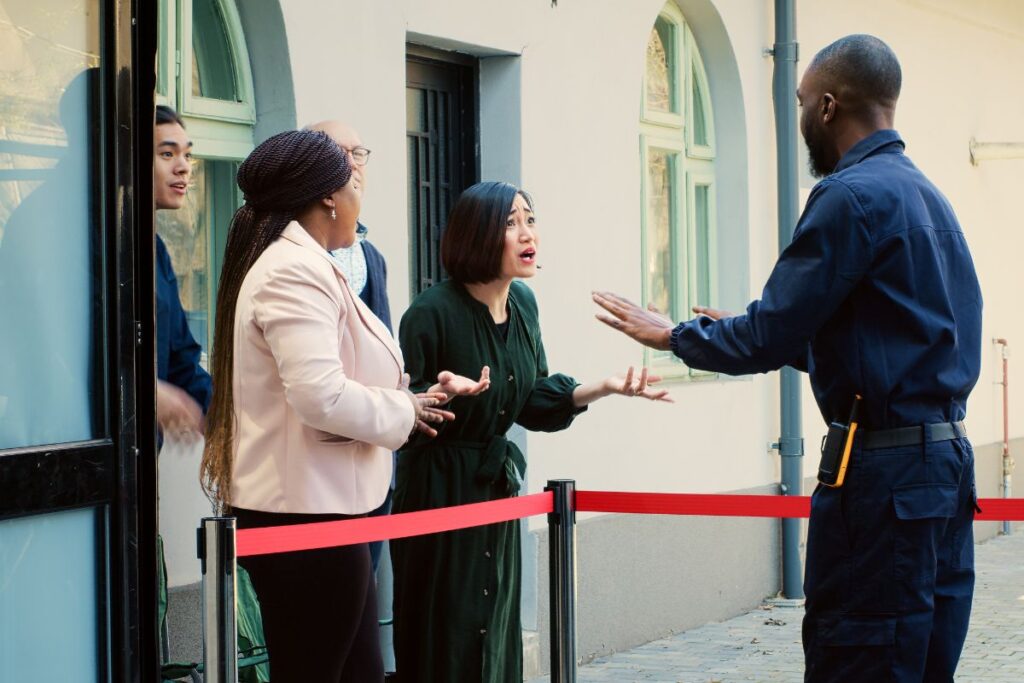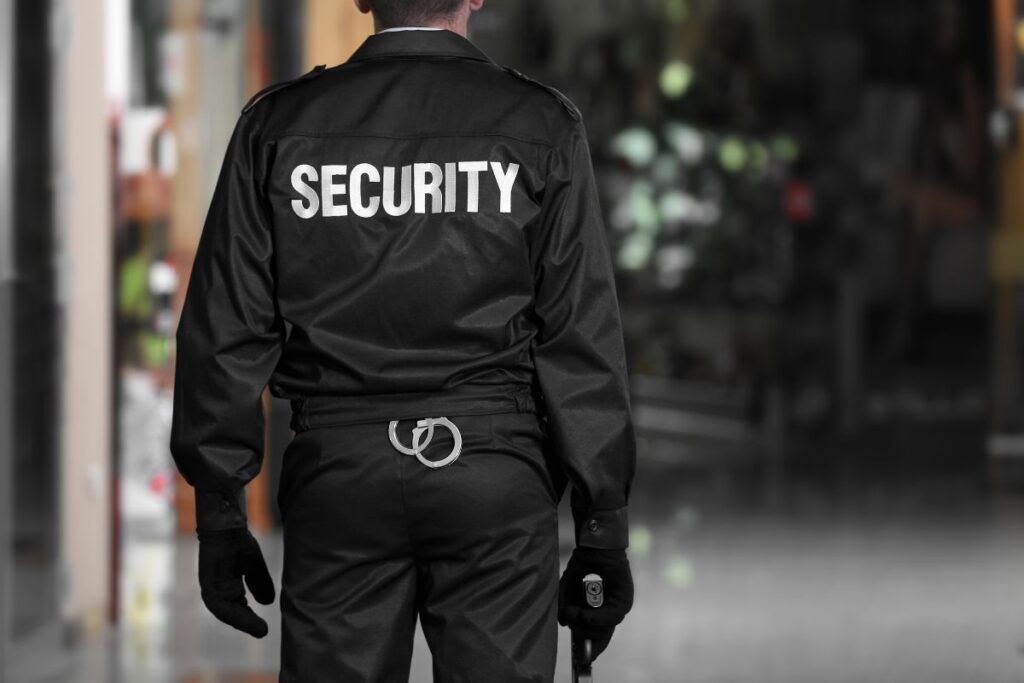How to Integrate CCTV and Security Guards for Better Property Protection

How to Integrate CCTV and Security Guards for Better Property Protection December 24, 2024 In today’s world, safeguarding property against potential threats demands more than just one layer of defense. Combining CCTV systems with security guards creates a synergy that offers unparalleled protection. CCTV cameras provide round-the-clock monitoring and detailed visual records, while security guards bring human intuition and the ability to act swiftly in real time. Together, they form a formidable defense mechanism. For properties with diverse needs, this combination ensures that no security loophole is left unaddressed. If you’re planning to implement an integrated security system, start by identifying specific risks and vulnerabilities. A clear understanding of your property’s unique needs lays the foundation for a comprehensive solution.For a tailored security plan, consult our services page to explore various security options. Why Integrating CCTV and Security Guards Enhances Property Safety CCTV cameras and security guards each have their strengths, but when combined, they significantly amplify the effectiveness of property protection. Cameras provide high-definition surveillance and evidence in case of incidents, while guards ensure a physical presence that deters criminal activity. Together, they minimize blind spots, improve response times, and enhance accountability. This dual-layered approach ensures that your property remains protected from all angles, addressing both immediate and long-term security concerns. For instance, with video analytics and real-time alerts, guards can respond proactively to suspicious activities. To see how technology elevates security operations, explore our blog on the role of technology in enhancing security guard efficiency. Designing a Custom Security Plan with CCTV and Guards The key to effective integration lies in creating a security plan tailored to your property. Begin by assessing vulnerable areas such as entry points, dark corners, and secluded zones. Strategically place CCTV cameras in these high-risk areas to ensure complete coverage. Security guards should patrol locations that cameras cannot actively monitor, adding a layer of unpredictability to your defense. Equip guards with devices that provide access to live CCTV feeds, enabling them to react promptly. Regular maintenance of the CCTV system and periodic patrol adjustments are also crucial for maintaining efficiency. For professional advice on setting up integrated systems, get started with our quote services. Leveraging Advanced Technology for Proactive Security Integrating cutting-edge technology like video analytics and body cameras enhances the performance of both CCTV systems and security guards. Video analytics features, such as motion detection and facial recognition, allow for real-time detection of unusual activity, enabling guards to respond faster. Body cameras, on the other hand, provide transparency and accountability, ensuring guards adhere to best practices. This combination not only improves security outcomes but also instills confidence in property owners and stakeholders. Learn more about the importance of body cameras for security guards and their role in modern security setups. Training Security Guards to Operate CCTV Systems One of the most critical aspects of integration is training your security personnel. Guards should understand how to operate CCTV systems, interpret video feeds, and use footage to make informed decisions. Regular training sessions improve coordination between technology and human intervention, ensuring seamless operations. This alignment reduces response time during emergencies and creates a culture of accountability among the security team. As new technologies emerge, ongoing training ensures your security team stays ahead of potential threats. For security strategies involving crowd control, refer to our guide on crowd management at events. Benefits of Integrating CCTV with Security Guards Combining CCTV cameras with security guards offers several undeniable advantages: Enhanced Surveillance: Constant monitoring paired with on-ground vigilance. Faster Response Times: Guards are instantly notified of unusual activities through live video feeds. Reduced Operational Costs: Optimized allocation of resources minimizes reliance on either solution individually. Increased Deterrence: Visible cameras and guards discourage criminal behavior. Evidence Collection: High-quality footage and guard reports provide detailed incident documentation. For reliable and advanced surveillance solutions, visit Buy Security Cameras. Conclusion: A Smarter Way to Protect Your Property Integrating CCTV systems with security guards ensures an all-encompassing security strategy that protects against potential threats. This combination leverages the best of technology and human expertise to create a robust, scalable, and proactive defense. Whether it’s a residential property, a commercial establishment, or an event space, this integrated approach offers peace of mind and tangible security benefits. Begin your journey toward better protection by evaluating your property’s needs and implementing a system that works for you. You can also visit for post. Related Posts Understanding The Importance Of Corporate Security Why Shopping Centres Need Dedicated Security Teams Essential accessories and instruments for security guard for night duty Private vs. Public Security: A Detailed Comparison How Security Guards Support VIP and Executive Protection Role of Security Guards in Construction Site Safety How to become a security guard in Australia? The Role of Guards in Educational Institutions Top Benefits of Having Security Guards in High-Risk Areas How Security Guards Handle Suspicious Packages: A Comprehensive Guide Understanding the Limits: What Security Guards Can and Cannot Do Different Types of Security Guard Services Responsibilities of Security Guards in Australia The Importance of Body Cameras for Security Guards The Role of Technology in Enhancing Security Guard Efficiency How Security Guards Manage Safety Challenges at Oktoberfest Understanding the Importance of Crowd Management at Events Emergency Response Protocols Every Security Guard Should Know How Security Guards Prevent Theft in Retail Stores The Role of K-9 Units in Security Guard Services
Understanding the Importance of Crowd Management at Events

Understanding the Importance of Crowd Management at Events December 23, 2024 Crowd management is a critical component of event planning, ensuring the safety, comfort, and security of all attendees. Whether it’s a sports event, a concert, or a large-scale public gathering, the role of crowd management cannot be overstated. A well-managed crowd not only ensures a positive experience for everyone involved but also mitigates potential risks such as accidents, violence, or crowd surges. Security guards are at the forefront of this effort, leveraging their skills and training to control crowd movement, respond to emergencies, and prevent security breaches. Effective crowd management requires a careful balance of proactive strategies and reactive responses. This is why professional event security services in Melbourne are essential to ensuring smooth operations at any large-scale event. Security guards are equipped to handle all aspects of crowd control, from managing entry points to guiding the flow of attendees, creating a safe environment for everyone involved. Key Responsibilities of Security Guards in Managing Event Crowds Security guards play a diverse and crucial role in crowd management at events. Their responsibilities go beyond mere supervision; they act as both deterrents and responders to ensure crowd control. Some of the key responsibilities include: By effectively executing these responsibilities, security guards contribute directly to the overall success and safety of an event. The Strategic Benefits of Security Guards in Event Crowd Control Hiring professional security guards for crowd control offers numerous strategic advantages. Their expertise provides peace of mind for both event organizers and attendees, ensuring that potential threats are minimized, and that any issues are dealt with efficiently. Key benefits include: By incorporating professional security teams, event organizers ensure that their event runs smoothly and securely, reducing the risks and challenges associated with large gatherings. The Essential Training and Expertise of Security Guards for Crowd Management The training and expertise required for effective crowd management go far beyond basic security procedures. Security guards assigned to events undergo specialized training to prepare them for the unique challenges they may face. Key aspects of their training include: This combination of practical training and psychological expertise ensures that security guards can handle any crowd-related challenge efficiently and effectively. Tools and Technology Utilized by Security Guards for Efficient Crowd Management To further enhance their ability to manage large crowds, security guards are equipped with an array of tools and technologies that allow them to monitor and control the situation with precision. Some of the key tools include: These tools not only enhance the efficiency of security personnel but also create a more secure environment for all attendees. Learn more about the role of security guards in managing workplace conflicts to see how these skills extend beyond just event security. Conclusion: In conclusion, security guards are indispensable to the successful management of event crowds. Their presence helps mitigate risks, maintain order, and ensure the safety of everyone involved. From monitoring attendee behavior to responding to emergencies, their training and expertise make them essential to large-scale event management. For event organizers, hiring professional security services is not just a precaution—it’s a critical investment in the safety and smooth operation of the event. For more insights into how security guards manage complex situations, explore our articles on common challenges faced by security guards and how to become a security guard in Australia. Related Posts Why Are Security Uniforms Essential? Skills and Qualifications for a Private Investigator How Security Guards Manage Safety Challenges at Oktoberfest The Role of Guards in Educational Institutions Private vs. Public Security: A Detailed Comparison Understanding the Limits: What Security Guards Can and Cannot Do Effective Self-Defense Tactics and Techniques for Security Guards The Role of Security Guards in Airport Security Role of Security Guards in Construction Site Safety How to Integrate CCTV and Security Guards for Better Property Protection Understanding the Importance of Crowd Management at Events How to Establish a Security Guard Business in Australia The Role of Technology in Enhancing Security Guard Efficiency The Role of K-9 Units in Security Guard Services How much do security companies charge in Australia Emergency Response Protocols Every Security Guard Should Know The Importance of Body Cameras for Security Guards Evolution of Security Guard Training & Certification in Australia Why Shopping Centres Need Dedicated Security Teams How Security Guards Handle Suspicious Packages: A Comprehensive Guide
The Role of Security Guards in Managing Workplace Conflicts

The Role of Security Guards in Managing Workplace Conflicts November 18, 2024 Workplace conflicts, if not addressed effectively, can disrupt organizational harmony, affect employee productivity, and lead to potential safety issues. Security guards serve as an essential component of conflict management by maintaining order, promoting a secure environment, and implementing resolution strategies. This comprehensive article explores their multifaceted role in resolving workplace disputes. Preventing Conflicts Before They Arise Security guards play a proactive role in creating a harmonious workplace by identifying and addressing potential sources of conflict early. They are trained to observe body language, monitor interactions, and recognize situations that might escalate into disputes. By establishing a visible presence, security guards act as a deterrent against hostile behavior. Employees are less likely to engage in arguments or misconduct when they know a trained professional is observing. Additionally, security guards work closely with HR teams to maintain adherence to workplace policies, further reducing the chances of conflict. For environments like schools and educational institutions, early conflict prevention is even more critical. Learn how guards are trained for such scenarios on the role of guards in educational institutions. Facilitating Peaceful Resolutions In many cases, security guards serve as impartial mediators. Their role is to facilitate communication between conflicting parties, ensuring everyone has the opportunity to express their concerns. Using their training in de-escalation techniques, they guide discussions toward peaceful resolutions, promoting understanding and compromise. For corporate environments, where sensitive information or high-pressure deadlines can trigger disputes, the presence of security guards ensures professional and calm resolutions. Explore how this aligns with corporate security services. Handling Physical Conflicts Safely When workplace conflicts escalate into physical altercations, security guards step in to restore order while ensuring the safety of everyone involved. Their training in crowd control, risk assessment, and physical intervention equips them to handle such scenarios effectively. Guards employ strategies to separate conflicting parties, diffuse the situation, and prevent further escalation. They also document incidents thoroughly, providing detailed reports for internal investigations or legal proceedings if necessary. For high-security environments like airports, where conflicts may arise due to stress or delays, security guards play a critical role. Discover more in the role of security guards in airport security. Enforcing Compliance with Workplace Policies Security guards ensure employees adhere to workplace rules and ethical standards, thereby reducing conflicts that arise from policy violations. Whether it’s addressing issues like harassment, tardiness, or misuse of company resources, guards act as enforcers of organizational policies. This proactive approach not only minimizes conflicts but also cultivates a culture of accountability and respect within the workplace. For schools, this responsibility extends to maintaining a safe learning environment. Read more about school security services. Acting as a Reliable Point of Contact During Crises During severe conflicts or crises, security guards serve as the first responders. Their ability to remain calm under pressure, combined with their training in emergency response, makes them an invaluable asset. Guards coordinate with external agencies like law enforcement or emergency medical teams when needed. They also guide employees during evacuations or lockdowns, ensuring everyone’s safety. Building a Trustworthy Workplace Environment The consistent presence of security guards fosters a sense of trust and security among employees. Workers feel confident knowing they can rely on a professional to address conflicts or safety concerns without bias. This trust is especially vital in environments where employees interact with external parties, such as corporate offices or educational institutions. Guards enhance workplace morale by providing a secure foundation for productivity and collaboration. Specialized Training in Conflict Resolution Security guards undergo rigorous training that equips them with skills in nonviolent communication, active listening, and conflict de-escalation. This training is tailored to meet the unique challenges of various industries, ensuring guards can adapt their approach as needed. For workplaces with high-stress environments, such as corporate settings, this expertise ensures that conflicts are handled professionally and efficiently. Request trained professionals for your workplace via our quote request page. Collaborating with Management for Long-Term Solutions Security guards often collaborate with management and HR teams to identify recurring sources of workplace conflict. Through regular reporting and open communication, they provide valuable insights that help in crafting long-term strategies for conflict prevention. For example, guards might suggest changes in workplace layout to reduce congestion or recommend additional training programs for employees. This collaboration ensures a proactive approach to conflict management. By effectively managing workplace conflicts, security guards help organizations maintain a safe and productive environment. Their ability to prevent, de-escalate, and resolve disputes underscores their importance in today’s workplaces. If you’re looking to strengthen your workplace security, explore our tailored services and get a quote today. Related Posts What is Mobile Security Patrol, and Why Do You Need It? Effective Self-Defense Tactics and Techniques for Security Guards How to become a security guard in Australia? How Security Guards Handle Suspicious Packages: A Comprehensive Guide Private vs. Public Security: A Detailed Comparison The Role of Guards in Educational Institutions How to Establish a Security Guard Business in Australia Top Security Threats in Australian Retail and How Guards Mitigate Them Role of Security Guards in Construction Site Safety The Importance of Body Cameras for Security Guards Different Types of Security Guard Services How Security Guards Prevent Theft in Retail Stores How to Integrate CCTV and Security Guards for Better Property Protection Understanding The Importance Of Corporate Security The Role of Security Guards in Airport Security Common Challenges Faced by Security Guards in Australia The Role of Security Guards in Managing Workplace Conflicts The Role of Technology in Enhancing Security Guard Efficiency Essential accessories and instruments for security guard for night duty Emergency Response Protocols Every Security Guard Should Know
Effective Self-Defense Tactics and Techniques for Security Guards

Effective Self-Defense Tactics and Techniques for Security Guards November 14, 2024 In the high-stakes world of security, self-defense is more than just a skill—it’s an essential part of a security guard’s training and day-to-day readiness. From safeguarding high-risk areas to providing executive protection, the role of a security guard often demands quick reflexes, sound judgment, and tactical prowess. Learning effective self-defense tactics empowers guards to handle potentially hostile situations, ensuring their own safety and the safety of others. This article explores critical self-defense techniques every security guard should master, from situational awareness to the responsible use of defensive tools. Whether operating in educational institutions, securing VIPs, or managing entry points as static security guards, mastering these self-defense fundamentals is key to maintaining a safe and controlled environment. Situational Awareness: The Cornerstone of Security Situational awareness is arguably the most important aspect of a security guard’s self-defense toolkit. It involves being highly attuned to the environment, identifying unusual behavior, and staying alert for signs of potential threats. This skill enables guards to prevent incidents before they escalate, especially in high-risk areas where quick response time is crucial. By understanding the subtle cues—such as unusual body language or suspicious actions—guards can take preventative measures, staying a step ahead of potential confrontations. When providing static security, situational awareness helps guards monitor activity consistently, reducing risks by identifying issues early on. For security guards operating in educational institutions or high-traffic environments, this skill is especially valuable. A well-trained security professional can anticipate and de-escalate incidents before they turn into security breaches, helping create a safer atmosphere for students and staff alike. You can learn more about how guards contribute to safe educational environments here. De-escalation Techniques: Reducing Conflict Without Physical Force De-escalation is a critical technique for security guards, allowing them to manage aggressive situations without resorting to physical force. This skill is vital in areas where security presence alone might not deter unruly behavior, such as high-traffic public areas or during executive protection tasks. Effective de-escalation relies on verbal strategies, calm demeanor, and active listening, helping guards manage intense situations by reducing aggression levels. For instance, in a high-stress environment where VIPs are present, guards who employ de-escalation can handle disruptions diplomatically, maintaining order while minimizing risk. Utilizing open body language, speaking in a calm, measured tone, and acknowledging the individual’s concerns can have a significant impact on calming situations. Guards should remember that de-escalation doesn’t mean yielding but rather taking control through empathy and effective communication. For more insights on managing security for VIPs, refer to this guide on executive protection. Basic Physical Defense Tactics: Essential Moves Every Guard Should Know Physical defense tactics are essential for guards to protect themselves and others if a situation escalates into physical confrontation. Guards should master a solid defensive stance, proper footwork, and basic blocking techniques. A strong, balanced stance with a slight bend in the knees allows guards to maintain control and remain prepared to respond to an aggressor. Blocking techniques using the forearms or hands can shield guards from strikes, helping them remain safe until they can exit the confrontation or gain control of the individual. Practicing these tactics in regular training ensures that guards can handle unexpected confrontations calmly and effectively. In scenarios such as controlling entry points for static security or when managing large crowds, mastering these defensive techniques can prove invaluable. To learn more about how static guards contribute to overall security, explore this article. Escape and Evasion Tactics: Knowing When and How to Retreat Escape and evasion tactics are just as important as engagement techniques in security. A skilled security guard knows when to remove themselves from a dangerous situation, prioritizing their own safety and the safety of those around them. Quick footwork and strategic movement allow guards to evade an aggressor’s reach, giving them time to assess the situation and decide on the next step. In high-risk areas, these skills can be life-saving, as they prevent guards from becoming overwhelmed in hostile situations. Understanding the layout of the environment, including exits and safe routes, is fundamental to successful evasion. Guards should also be aware of any objects in their surroundings that could serve as barriers if they need to retreat. When working in areas prone to unexpected threats, escape and evasion are vital for keeping situations controlled and manageable. To understand more about guarding in high-risk areas, check out this article. Self-Defense Tools and Their Responsible Use Self-defense tools, such as pepper spray and batons, are non-lethal options that can be essential during a confrontation. However, proper training in the use of these tools is crucial to prevent misuse. Guards should understand when it’s appropriate to use pepper spray, and in what circumstances a baton might be necessary. The use of these tools must be responsible, ensuring that minimal force is applied to subdue or deter the aggressor effectively. Guards should practice these techniques regularly to ensure they can deploy them efficiently if the need arises. The goal is always to prevent escalation rather than inflict harm, and tools should only be used when absolutely necessary. Understanding and respecting local laws surrounding self-defense tools also helps guards remain compliant while carrying out their duties. To learn more about the services where such self-defense tools are commonly utilized, visit Security Guard Services. Legal and Ethical Considerations in Self-Defense Legal and ethical training is essential for security guards who are regularly exposed to potentially dangerous situations. Understanding the concept of “reasonable force” allows guards to apply force within legal boundaries, protecting themselves while staying compliant with laws governing the use of force. This knowledge is especially critical in settings where the presence of guards is high-profile, such as during VIP protection or in educational institutions. Ethical training instills the importance of maintaining public trust, prioritizing the well-being of all involved parties, and using self-defense measures only when absolutely necessary. Security guards are often seen as authority figures, and ethical conduct strengthens their reputation and the trust clients place in


